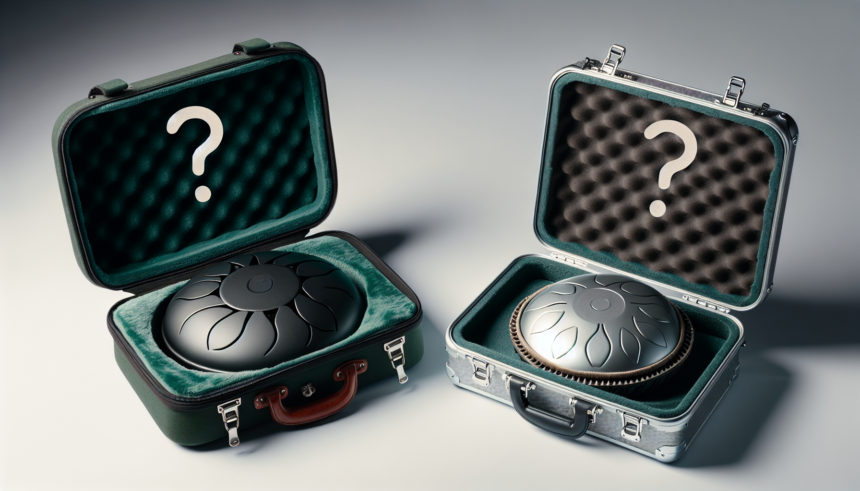Handpans are exquisite and delicate musical instruments that produce ethereal sounds. Naturally, such an investment demands proper care, especially during transport. Choosing the right case for your handpan can be a significant decision, involving considerations of protection, convenience, and cost. This article delves into the differences between soft and hard handpan cases, helping you make an informed choice tailored to your needs.
Understanding Soft Handpan Cases
Soft handpan cases are generally crafted from fabric or a combination of fabric and padding. Popular materials include nylon, polyester, and various types of foam padding. Here’s a closer look at the main attributes of soft handpan cases:
1. Portability
One of the foremost advantages of soft cases is their lightweight nature. These cases are designed for musicians who are on the move, making it easier to carry your handpan for longer distances. Soft cases usually come with shoulder straps and backpack-style options, allowing for ergonomic and hands-free transportation.
2. Flexibility
The flexible exterior of soft cases can be a huge perk. Soft cases can be stored more easily when not in use due to their collapsible nature, which is particularly useful for those with limited storage space.
3. Cushioning
Although they may lack the solid protective shell of hard cases, high-quality soft cases are equipped with padding that offers substantial protection against minor bumps and abrasions. Many premium soft cases even feature multiple layers of padding inside, providing ample cushioning.
4. Cost
Typically, soft handpan cases are more affordable than their hard-shell counterparts. If budget constraints are a consideration, soft cases provide a cost-effective solution without compromising on basic protection.
Exploring Hard Handpan Cases
Hard handpan cases, as the name suggests, consist of a rigid outer shell, usually made from materials like plastic, fiberglass, or metals. Here’s what you need to know about them:
1. Superior Protection
The most significant advantage of hard cases is their ability to offer superior protection. The rigid shell is designed to withstand substantial impacts, safeguarding your handpan from serious damage. This is particularly important when traveling by air or other means where the instrument might be subjected to harsh conditions.
2. Waterproof
Many hard cases come with water-resistant or waterproof qualities, providing an additional layer of protection against environmental factors such as rain and humidity. This makes hard cases ideal for outdoor gigs and traveling in adverse weather conditions.
3. Security
Hard cases often feature lockable latches, offering added security. This could be crucial if you tend to leave your handpan unattended in public spaces or need an extra layer of security while traveling.
4. Durability
Built to last, hard cases are generally more durable than soft cases. They can withstand significant wear and tear, making them a long-term investment for musicians who require robust protection for their instruments.
5. Heaviness
One downside to hard cases is their weight. The robust construction makes them heavier and bulkier compared to soft cases, which may be a drawback for some musicians. While they provide unmatched protection, lugging around a heavy case can be cumbersome.
Factors to Consider
When it comes to choosing between a soft and hard handpan case, several factors come into play:
1. Frequency of Travel
If you travel frequently and often find yourself on the road or in airplanes, a hard case may be worth the extra weight and cost for its superior protection. However, if your travel is limited to local gigs or short distances, a soft case may suffice and offer greater convenience.
2. Mode of Transportation
Consider how you mostly transport your handpan. Musicians who often use public transport, walk, or bike might find the lightweight and flexible nature of soft cases more practical. If you usually drive, a hard case might be the safer bet, as it can protect the instrument from potential impacts during transit.
3. Budget
For musicians on a tighter budget, soft cases are generally more affordable and provide a decent level of protection. However, if you’re willing to invest more for maximum security, a hard case could be considered a valuable long-term investment.
4. Storage
Evaluate your storage space. Soft cases are easier to store when not in use because they can be collapsed or packed away. On the other hand, hard cases take up more space but offer added peace of mind.
Conclusion
In conclusion, both soft and hard handpan cases come with their unique sets of advantages and disadvantages. Your choice should be guided by your specific needs, preferences, and circumstances. Soft cases offer cost-effectiveness, portability, and flexibility, making them suitable for local travel and everyday use. Hard cases, while heavier and more expensive, provide unparalleled protection and security, ideal for frequent travelers and situations demanding maximum safety. By assessing factors such as travel frequency, transportation mode, budget, and storage needs, you can find the perfect case to safeguard your cherished handpan.
FAQs
1. Can a soft case protect my handpan during air travel?
While soft cases offer some level of protection, they might not be sufficient for the rigorous conditions of air travel. A hard case is recommended for air travel due to its superior ability to withstand impacts and rough handling.
2. Are hard cases for handpans worth the investment?
If you frequently travel long distances or want maximum protection for your instrument, a hard case can be a worthwhile investment. They provide excellent security against impacts, weather conditions, and potential theft.
3. Do soft cases come with backpack straps?
Many soft cases come with ergonomic backpack straps, allowing for easier and more comfortable transportation. This feature can be particularly handy for musicians who need to carry their handpans over long distances.
4. Are there any lightweight hard cases available?
Yes, some hard cases are designed to be lighter without compromising on protection. Materials like fiberglass or special lightweight plastics can provide robust protection while reducing the overall weight.
5. How can I ensure the best fit for my handpan in the case?
Always check the size and specifications of the case to ensure it matches your handpan’s dimensions. Look for cases with adjustable or removable padding to achieve a snug and secure fit.





